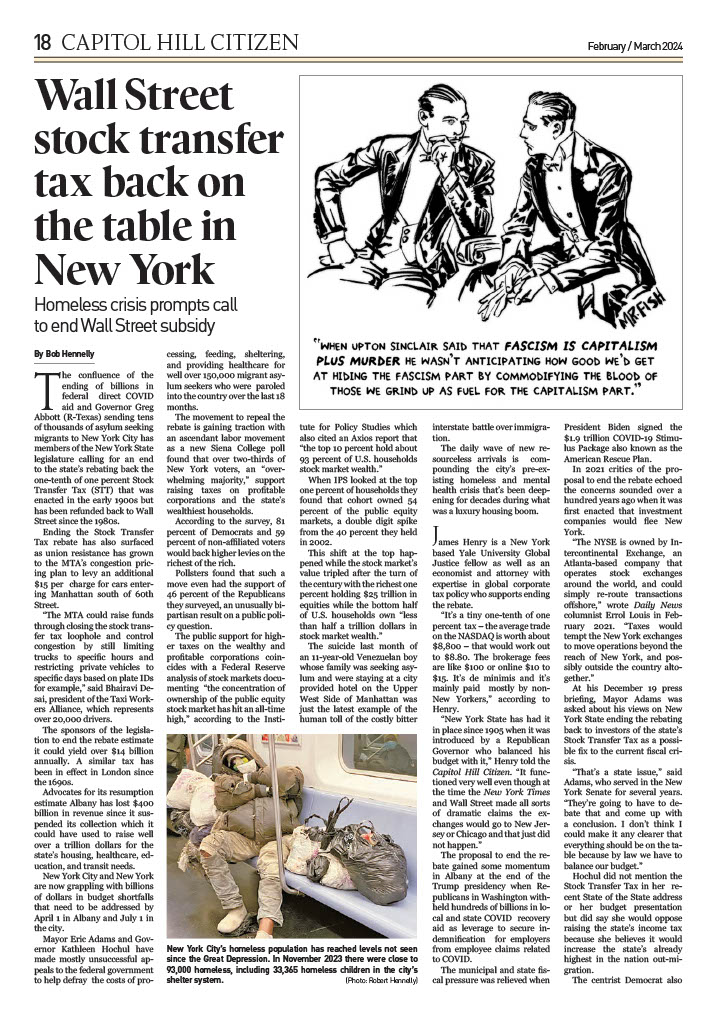The confluence of the ending of billions in federal direct COVID aid and Governor Greg Abbott (R-Texas) sending tens of thousands of asylum seeking migrants to New York City has members of the New York State legislature calling for an end to the state’s rebating back the one-tenth of one percent Stock Transfer Tax (STT) that was enacted in the early 1900s but has been refunded back to Wall Street since the 1980s.
That’s according to a story by reporter Bob Hennelly in the February/March 2024 issue of the Capitol Hill Citizen.
Ending the Stock Transfer Tax rebate has also surfaced as union resistance has grown to the MTA’s congestion pricing plan to levy an additional $15 per charge for cars entering Manhattan south of 60th Street.
“The MTA could raise funds through closing the stock transfer tax loophole and control congestion by still limiting trucks to specific hours and restricting private vehicles to specific days based on plate IDs for example,” said Bhairavi Desai, president of the Taxi Workers Alliance, which represents over 20,000 drivers.
The sponsors of the legislation to end the rebate estimate it could yield over $14 billion annually. A similar tax has been in effect in London since the 1690s.
Advocates for its resumption estimate Albany has lost $400 billion in revenue since it suspended its collection which it could have used to raise well over a trillion dollars for the state’s housing, healthcare, education, and transit needs. New York City and New York are now grappling with billions of dollars in budget shortfalls that need to be addressed by April 1 in Albany and July 1 in the city.
Mayor Eric Adams and Governor Kathleen Hochul have made mostly unsuccessful appeals to the federal government to help defray the costs of processing, feeding, sheltering, and providing healthcare for well over 150,000 migrant asylum seekers who were paroled into the country over the last 18 months.
The movement to repeal the rebate is gaining traction with an ascendant labor movement as a new Siena College poll found that over two-thirds of New York voters, an “overwhelming majority,” support raising taxes on profitable corporations and the state’s wealthiest households.
According to the survey, 81 percent of Democrats and 59 percent of non-affiliated voters would back higher levies on the richest of the rich. Pollsters found that such a move even had the support of 46 percent of the Republicans they surveyed, an unusually bipartisan result on a public policy question.
The public support for higher taxes on the wealthy and profitable corporations coincides with a Federal Reserve analysis of stock markets documenting “the concentration of ownership of the public equity stock market has hit an all-time high,” according to the Institute for Policy Studies which also cited an Axios report that “the top 10 percent hold about 93 percent of U.S. households stock market wealth.”
When IPS looked at the top one percent of households they found that cohort owned 54 percent of the public equity markets, a double digit spike from the 40 percent they held in 2002. This shift at the top happened while the stock market’s value tripled after the turn of the century with the richest one percent holding $25 trillion in equities while the bottom half of U.S. households own “less than half a trillion dollars in stock market wealth.”
[To get a copy of the print edition of the Capitol Hill Citizen, see capitolhillcitizen.com]
